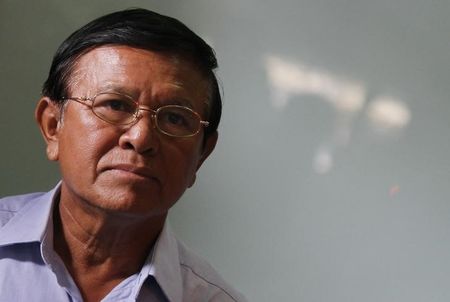By Prak Chan Thul
PHNOM PENH (Reuters) - Cambodia's opposition on Tuesday boosted its influence in a parliament long controlled by the ruling party, winning a deputy chairman post and assurances of greater legislative sway under a deal to end a year-long political impasse.
The election of Kem Sokha as deputy house speaker is one of a slew of concessions by Prime Minister Hun Sen seldom seen during his three-decade grip on politics, reflecting the opposition's newfound power and growing public discontent with an authoritarian premier.
The National Assembly has long been seen as a rubber stamp for Hun Sen's Cambodian People's Party (CPP), but it is now the most balanced it has ever been after the opposition reinvented itself and won 55 seats to the CPP's 68 in a disputed 2013 poll, running on promises to halt land grabs and raise factory wages.
The opposition Cambodia National Rescue Party (CNRP) controls 44 percent of the house, which it boycotted for a year over a poll it said was rife with fraud.
"Even though a CPP member is president, they can't ignore the huge voice of the opposition party. It's hard for them to do that, because we are a lot of people," Kem Sokha told reporters.
"But we can see that this is a good start."
RARE DEAL
Hun Sen refused to allow a re-run of the election, but with only his party in parliament and faced with months of sometimes violent protests, he struck a deal in July with CNRP leader Sam Rainsy to put aside their differences.
Sam Rainsy led some of the biggest street rallies ever seen in Cambodia and won the support of unions capable of holding hostage its vital $5-billion textiles sector, alarming global brands such as Nike, Gap and Adidas.
The July deal includes CNRP control of five house panels, broad electoral reforms, four of nine seats on the National Election Committee and a television channel license for CNRP.
Top CNRP lawmaker Mu Sochua told Reuters the party would be awarded on Wednesday the chairmanship of panels on farming, education, healthcare and human rights - key areas of public dissatisfaction with the CPP.
But rivalry between the two parties runs deep and the stakes are high given the scale of the challenge now facing Hun Sen, the self-styled "strongman" who is accused of crushing rivals and using patronage politics to prolong his rule.
Kem Sokha said he would propose that Sam Rainsy and Hun Sen meet regularly to iron out differences. Rainsy recently spoke of a need to "eliminate the culture of violence and revenge".
Political analyst Ou Virak said he was sceptical the two sides could cooperate and ensure the truce held. He anticipated the CPP would ensure it still got its way in parliament.

"It's more symbolic, it's more ceremonial than the real power," he said of the concessions.
(Editing by Martin Petty and Clarence Fernandez)
